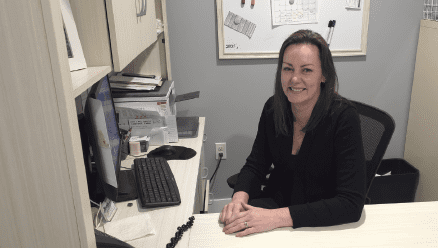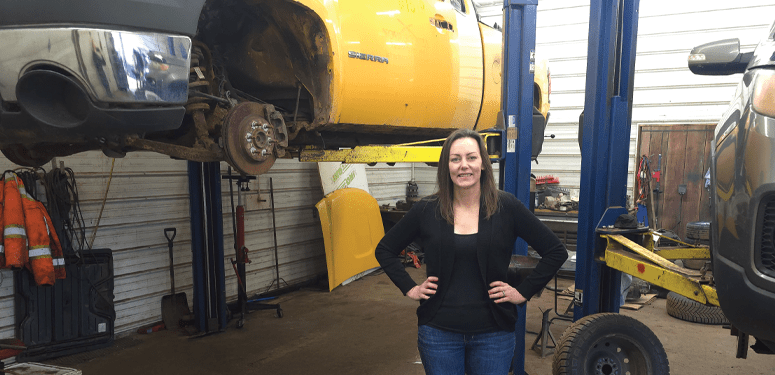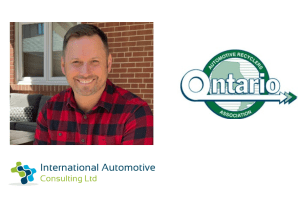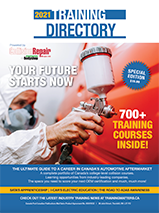For Candice Brown, automotive recycling is first and foremost a community operation
Story by/par Sarah Perkins
Candice Brown, office manager of Brown’s Auto Salvage in Wilmot, Nova Scotia, is more than ready to help when it comes to the business of automotive recycling. While she never imagined a career in the industry, a childhood spent in and around salvage yards and a strong desire to see her father’s dream continue on into the future has ensured that when it comes to lending a helpful hand, Brown is always willing to go above and beyond. Canadian Auto Recyclers recently spoke with Candice to hear her industry story; a journey that she now jokes leaves her with a need to constantly “stay up-to-date with everything.”
Canadian Auto Recyclers: How did you become involved in the industry?
Candice Brown: I basically grew up in the industry. My father started the business in 1975, and so my childhood was backgrounded by tow trucks and scrap vehicles. I would hang around the office and watch my father work. However, despite this early start, my intention was never to work in the business. When I got out of school, I went a completely different route with my career and became an esthetician. I also did merchandising for different companies. It wasn’t until around 2015 that my father began asking me to help with inventory. I was faster at the technical side of recording parts and so, I started in the evenings. I had some freedom in setting my hours at my other jobs and this is what initially allowed me to be involved. My transition into fully embracing the industry was a slow progression to begin with.
CAR: What interests you most about the industry?
CB: When I attended my first association meeting, it was nerve wracking because I didn’t know anybody. Then, I went to my second meeting and I really started just having conversations with people there, learning more and also discussing how we could move forward to continue making things better within the industry. This push for innovation is what I find particularly exciting.
Even though I don’t have the same love of cars as my dad or brother, I just have a love for the business and I want to see it succeed. I’ve been around automotive recycling my whole life. My father has always had dreams for this business and now, 50 years later, those dreams have been reached. In this way, for myself, helping to make the business successful and help it live on for my father, my family and the community is probably my biggest drive.
When it comes to community initiatives, we live in a small town and so there’s always lots that we can do in terms of reaching out and building those connections. Currently, we try to help out the community through more than just selling car parts; we participate in local donations and sponsorships. I like knowing that the business can help people who might not be as fortunate, because in today’s economy, it can be difficult to find resources. Ultimately, I just strive on the idea of how we can continue to make things better.
CAR: What have been your biggest learning curves in the industry?
CB: A lot of the skills and knowledge I have were originally self-taught. This is largely due to the fact that we’re transitioning as a business from my father’s original way of doing things to a more future-forward and technologically-powered approach. However, when I don’t know something, I’ve always felt like I could reach out to people in the industry. Everyone in the industry is wonderful, so if I have any questions, I know that they’ll get right back to me.
Another challenge is that I don’t have a mechanical background. I know my basic parts, but I don’t know the ins-and-outs of a car. If I’m being honest, I probably never will. As a result, this is one of the areas of the business where I struggle. But, when it comes to actually running the business, implementing new ideas or marketing, this is more of my strong suit.
However, despite this learning curve, I’m very open to learning. Whether this be through going to meetings or just talking to our staff, I just brainstorm and brainstorm until I can find the solution to the problem I’m working on. I’m also not afraid to ask questions because at the end of the day, it’s better to ask than to attempt to do something and then do it wrong.
CAR: Do you feel that you’ve had a different experience than others in the industry, given that it’s often a male-dominated space?
CB: When it comes to being a woman in the industry, I’ve definitely had more good than bad experiences. Everybody is phenomenal—at least to my face. At times, there can be some difficulties with the older and more traditional clientele that comes with living in a small town, and who expects to speak with a man when I answer the phone. However, overall, it’s really good to be where I am in the industry and I don’t let little hang ups bother me. Additionally, I understand that a lot of this struggle is something that just comes along with the transition to a second generation within the business. Customers are used to interacting with my father as he has been involved with the business for so long, and so, it’s just a process of getting people to the point where they know to ask for me instead of my father.
CAR: What are the biggest challenges facing the automotive recycling industry right now?
CB: When it comes to things that are going to impact the industry, electric vehicles are definitely up there. We can already see a lot more EVs on the road here, but it isn’t the same yet when compared to a larger city, so it’s something that’s still on the horizon for us and is going to come into play pretty strongly in the near future. Another struggle is rising costs within the industry which have skyrocketed since COVID. If you want to go to auction to buy cars to put in your salvage yard, the price is often crazy. This is more so because of the buyers from overseas and larger yards from places like Ontario that maybe have a little more disposable income than we do down here. Following this is wages. We want to pay our employees fairly and being a small business, you also have to make sure that you can be self-sustaining.
Finally, as with other aspects of the industry, we’re also experiencing the effects of ongoing talent and labour shortages. When it comes to mechanics and cars, there’s just not as many people, it seems, coming into the industry. Additionally, when people do enter into the industry, there’s steep competition for them and they often get grabbed up pretty quickly by service centres.
CAR: How is your facility addressing these challenges?
CB: At the heart of it, we just keep chugging. We’re very lucky to have three employees—two full-time, one part-time—on the counter who are doing fantastic. We also have our yard manager and dismantlers—we couldn’t do anything without them! We’ve made efforts to make sure that everyone who’s a part of the business, has the correct training and it’s really working out. We also reach out to the community and the industry for help and to put feelers out there when looking for people to join the team. In terms of electric vehicles, while this is further down the road for us, I know that they’re starting to offer training now to help prepare the industry and so, as it comes up in our area or in Halifax, we’ll start sending our employees so that they can prepare for the technology ahead of time.
CAR: What advice do you have for the automotive recycling industry in Canada, as a whole?
CB: My main advice for the industry is to never be afraid to just go for it! Educate yourself on everything. Even the people who have been in the industry for decades are always still learning new things, and this is because times are always changing. Just attend, connect with your community and put yourself out there. Ultimately, this is what first got me excited about the industry. I would also stress that automotive recycling is far more than just dismantling a car and selling parts. There’s so many opportunities if you are willing to open yourself up to learning.




























